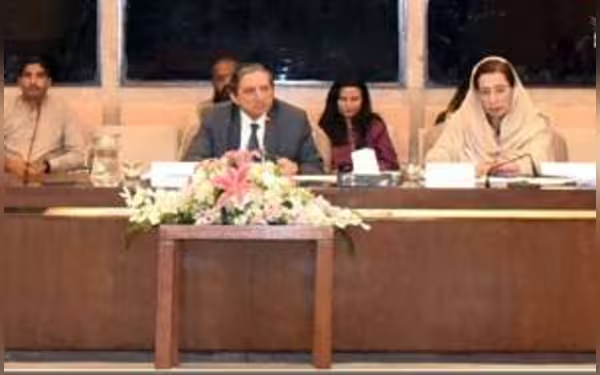Saturday, November 16, 2024 06:51 PM
Senate Committee Reviews Tax Policy and Banking Regulations in Pakistan
- Senate discusses 10% levy on Pakistan-Iran transport.
- FBR to penalize businesses for fake POS receipts.
- Islamic banking implementation progress raised concerns.
 Image Credits: nation_pk
Image Credits: nation_pkSenate Committee addresses tax policy, banking regulations, and Islamic banking implementation in Pakistan.
In a significant move towards enhancing Pakistan's economic framework, the Senate Standing Committee on Finance and Revenue convened on Wednesday to deliberate on crucial issues surrounding tax policy, banking regulations, and economic governance. Chaired by Senator Saleem Mandviwalla, the meeting took place at the Parliament House and aimed to address pressing matters that affect the public and the economy at large.
One of the primary topics of discussion was the controversial 10 percent levy imposed on transport and businesses operating between Pakistan and Iran. Senator Manzoor Ahmad Kakar raised this issue during a Senate session on September 9, 2024, highlighting the adverse effects it has had on Pakistani truck operators. The committee decided to refer this matter to the Standing Committee on Communications, clarifying that the levy, which was approved by the federal government, does not fall under the jurisdiction of the Federal Board of Revenue (FBR). Senator Kakar expressed his concerns regarding the unfair taxation faced by Pakistani trucks, noting that over 600 trucks are currently parked due to this levy.
Furthermore, the committee addressed a Starred Question posed by Senator Mohsin Aziz regarding the fees collected by the FBR for Point of Sale (POS) services and how these funds are utilized. The FBR chairman announced a new policy aimed at penalizing businesses that issue fake POS receipts, which will incur a fine of Rs5 lac and lead to the closure of shops involved in such fraudulent activities. Senator Aziz pointed out the existing weaknesses in enforcement, citing instances of fake receipts circulating in the market, including a suspicious bill marked “tentative” in Islamabad. The FBR chairman acknowledged these concerns and assured the committee that measures to strengthen enforcement would be implemented soon.
Another critical issue discussed was the status of Islamic banking in Pakistan. Senator Farooq Hamid Naek raised concerns about the slow progress towards the full implementation of Islamic banking, which is scheduled for 2027. The deputy governor of the State Bank of Pakistan (SBP) emphasized the importance of ongoing discussions regarding Islamic banking and reassured the committee that several banks are actively working towards compliance. A separate meeting is expected to be scheduled to focus on the abolition of interest and to provide a comprehensive briefing on Islamic banking practices.
In addition, the SBP provided a briefing on the performance of banking branches in smaller provinces. As of June 30, 2024, there are 3,334 banking branches operating in Balochistan, Khyber Pakhtunkhwa, Azad Jammu and Kashmir, and Gilgit-Baltistan, which account for 20 percent of the total banking branches nationwide. Moreover, 199 branches of microfinance banks are serving these regions, representing 13 percent of the country’s total microfinance network.
The committee also deferred discussions on a briefing by the Securities and Exchange Commission of Pakistan (SECP) regarding the role and functions of its Policy Board, following their request. Another pressing issue raised was the problem of counterfeit currency dispensed from ATMs. Senator Kakar highlighted a case where a young man received fake Rs5,000 notes from an ATM. In response, the CEO of Allied Bank of Pakistan assured the committee that security measures are being enhanced to tackle this issue effectively.
The meeting was attended by several senators, including Farooq Hamid Naek, Mohsin Aziz, Syed Shibli Faraz, Anusha Rahman Ahmad Khan, Danesh Kumar, Munzoor Ahmed, and Syed Faisal Ali Subzwari. The discussions held during this meeting reflect the Senate's commitment to addressing the economic challenges faced by the nation and ensuring a fair and efficient financial system for all citizens.
The deliberations of the Senate Standing Committee on Finance and Revenue underscore the importance of proactive governance in addressing economic issues. As Pakistan navigates its financial landscape, the focus on tax policy, banking regulations, and the implementation of Islamic banking will be crucial in fostering a stable and equitable economic environment. The outcomes of these discussions will not only impact businesses but also the everyday lives of citizens, making it imperative for the government to act decisively and transparently.













